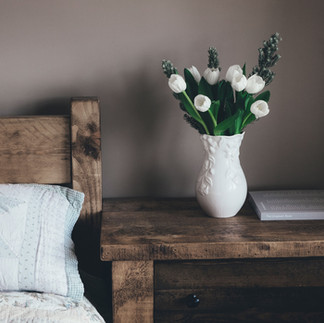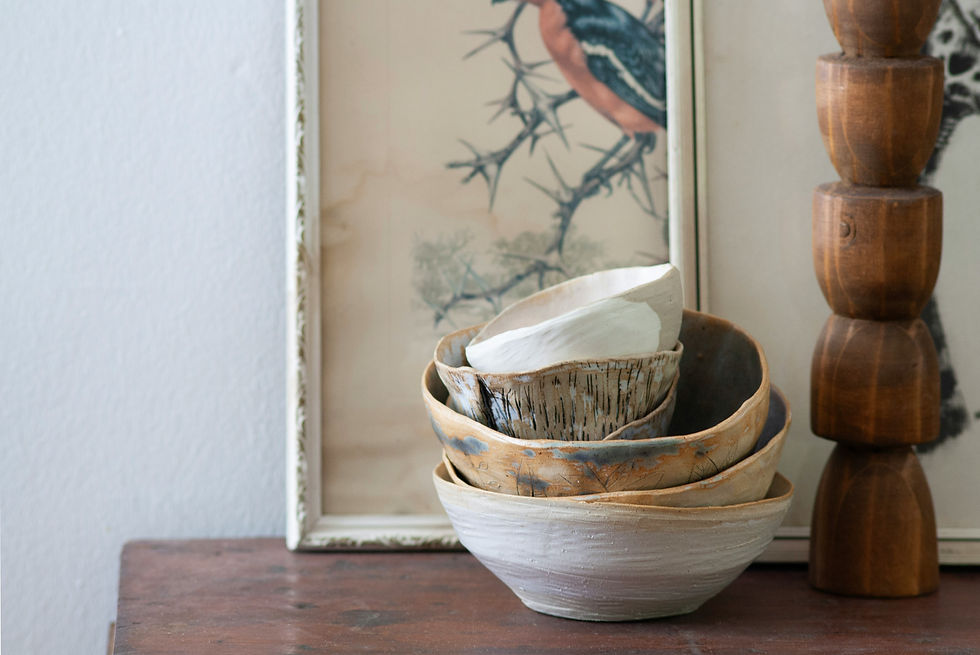Where does your heart go at 3am?
- Inbar Lee Hyams

- Aug 2, 2025
- 6 min read
Updated: Aug 26, 2025

This week's Torah portion, Va'etchanan (Deuteronomy 3:23-7:11), opens with Moses at his most vulnerable: "And I pleaded with God at that time, saying..." Last Tuesday at 3:47 AM, I found myself wide awake in my bed, whispering the same kind of prayer Moses offered at the Jordan River. Not about entering a promised land, but about a relationship that felt heavy, about a creative project that wasn't working, about that familiar ache of wanting something just beyond reach.
Who is this person who argues with God in the dark? Who pleads with the universe from under the covers?
Moses had just witnessed military victories that made him think maybe – just maybe – the divine decree keeping him from the Land had been overturned. Hope does that, doesn't it? It makes us believe the impossible might bend our way. But God's response was swift: "Enough. Do not speak of this matter to me again." Moses the great liberator would remain forever on the threshold, seeing but never crossing.
The deepest prayers emerge from our deepest longings, and the deepest longings often arise in our most intimate spaces.
What fascinates me is what happens next. Rather than rage or despair, Moses immediately pivots to teaching the Shema – Judaism's ultimate declaration of unity: "Hear, O Israel: God is our Lord, God is One." Rabbi Jonathan Sacks taught that we cover our eyes when reciting the Shema not from reverence alone, but to shift from the Greek world of seeing (where "I see" means "I understand") to the Hebrew world of hearing, where understanding comes through listening, where revelation happens through sound rather than sight. Moses understood something we forget: when our personal desires hit divine limits, we don't move toward fragmentation – we move toward unity.
It's about creating conditions for acceptance to become instinctive.
ROOM OF THE WEEK: THE BEDROOM
The bedroom is where we are most ourselves – stripped of public personas, daily armor removed. Like Moses at the river's edge, we come here to wrestle with what we cannot change and surrender to what must be. In feng shui, the bedroom governs restoration, intimacy, and the deep unconscious work that happens when we're not trying to control anything. It's where we practice the ultimate receptivity: sleep.
The bedroom is also where many of us do our most honest pleading. Away from witnesses, in that liminal space between waking and sleeping, we find ourselves echoing Moses' raw petition: "Let me see, let me cross over, let me have what feels just beyond my grasp."
DAILY ENERGY FOCUS
Sunday (Yang/Sun)
CLEAR your bedroom of anything that blocks smooth movement to your bed. What's the first thing you notice about how energy flows when you enter this space? Fire numbers (9) may find this particularly energizing for creating the kind of sanctuary that supports both rest and honest conversation with the divine.
Monday (Yin/Moon)
NOTICE how your bedroom feels in darkness – not just visual darkness, but the quality of silence, of hiddenness. Is there a sense of safety here for your most vulnerable thoughts? Like Rabbi Sacks taught about covering our eyes during Shema, sometimes we need to shut out the visual world to truly listen.
Tuesday (Fire/Joy)
ADD something warm to your bedroom – perhaps a small lamp for those 3 AM moments when we find ourselves pleading with the universe. Light creates the possibility of seeing clearly, even (especially) in our darkest hours, in a way that feels uniquely yours.
Wednesday (Water/Flow)
OBSERVE how energy moves through your bedroom during different times of day. What pools here? What feels stagnant? The flowing energy of water asks: Where do your deepest prayers get stuck, and where do they find release?
Thursday (Wood/Growth)
TEND to something living near where you sleep – a plant that can handle low light, or simply rearrange existing greenery. Growth requires both reaching toward light and establishing deep roots, just like Moses learned to do with his unfinished longing.
Friday (Metal/Structure)
ORGANIZE your bedside area with purpose – keep only what serves your rest and your honest conversations with yourself. The structured energy of metal asks: What barriers are you maintaining between your daytime self and your pleading self?
Saturday (Earth/Grounding)
REST in your bedroom for fifteen minutes without agenda – no phone, no book, no task. Simply be present to this space that holds your dreams, your fears, your whispered prayers. Earth numbers (2, 5, 8) may find this especially centering.
BAGUA MAP BY ROOM
Before we look at where your bedroom falls, consider this: Where in your life do you feel genuinely content and want to savor what you have? Your family relationships or creative achievements? And where is that restless feeling calling you to reach for something new - your personal growth or professional aspirations?
Moses' experience at the Jordan River embodies the sacred truth of the fifth chakra: surrendering personal will to divine will, as Caroline Myss teaches in "Anatomy of the Spirit." Sometimes our deepest spiritual work happens in learning to hold both gratitude for what is and acceptance of what cannot be.
Once you identify these areas, you can use your bedroom (and the corresponding bagua areas) to support both needs - either deepening gratitude for what exists or creating space for new possibilities to emerge.
If your bedroom falls in one of these areas of the bagua map, here's how to work with this week's theme of pleading and unity:
In BTB feng shui, we align your front door with the bottom of the tic tac toe board below to determine the location of each gua. This is different from the Compass approach to feng shui which uses directions for alignment. Also note that the rooms and walls of your home won't perfectly align with the bagua map, and some rooms may fall in more than one gua area.
┌─────────────────┬─────────────────┬─────────────────┐
│ Wealth │ Fame │ Relationships │
│ Corner │ Corner │ Corner │
├─────────────────┼─────────────────┼─────────────────┤
│ Family │ Center │ Children │
│ Corner │ │ Corner │
├─────────────────┼─────────────────┼─────────────────┤
│ Knowledge │ Career │ Helpful People │
│ Corner │ Corner │ Corner │
└─────────────────┴─────────────────┴─────────────────┘
↑ ↑ ↑
Front door typically aligns somewhere along this edgeWealth Area: How does your bedroom here support or challenge your relationship with abundance? Connect this to Moses' experience of being given enough (military victories, divine relationship, leadership) yet still longing for more. Consider adding a green plant that can thrive in low light, as the wood element here supports growth and prosperity like the eldest daughter energy of pioneering responsibility that governs this area.
Fame Area: How does your bedroom in the fame area support or challenge your authentic expression? Moses knew he was seen and known by God, even when his deepest request was denied. Fire elements naturally belong here - warm lighting or triangular shapes in artwork that help your truest self shine with passion and transformation.
Relationships Area: How does your bedroom here support or challenge your intimate connections? Moses learned that even our relationship with the divine involves boundaries and acceptance. Earth elements create stability here - yellow colors or ceramics that enhance the mother energy of nurturing and unconditional love that rules this area.
Family Area: How does your bedroom in the family area support or challenge your connection to lineage and belonging? Moses carried the responsibility of an entire people into his private pleading. Wood elements support both tradition and growth - a tall plant or rectangular furniture that embodies the strength and vision of this area.
Center: How does your bedroom as the center affect your overall life balance? This is the ultimate unity position – where all areas of life converge in the space of rest. Earth elements create the grounding needed here - golden yellow colors or singing bowls that support the balance and centeredness required for integration.
Children Area: How does your bedroom here support or challenge creativity and new beginnings? Moses' unfulfilled longing became the foundation for teaching the Shema. Metal elements support completion here - white accents or round shapes that help transform raw creativity into refined expression.
Knowledge Area: How does your bedroom here support or challenge your learning and inner wisdom? This is where Moses-like pleading transforms into acceptance and deeper understanding. Earth elements enhance contemplation - brown tones or solid shapes that convey the stability needed for deep introspective work.
Career Area: How does your bedroom in the career area support or challenge your life path? Moses discovered that his greatest teaching came through accepting limitation rather than overcoming it. Water elements support flow - blue tones or wavy shapes that reflect possibility even within constraints.
Helpful People Area: How does your bedroom here support or challenge your relationship with guidance and support? Moses learned that sometimes the greatest help is being told "no" with clarity rather than "maybe" with false hope. Metal elements create boundaries - silver colors that connect to the father energy of structure and guidance that governs this area, maintaining clarity about what's possible.
Not sure how to read your space according to this map? Click here.
CLOSING INSIGHT
According to the Midrash, Moses stopped pleading not because God grew tired of hearing him, but because one more prayer would have been so powerful that God would have had to grant his request. Sometimes our deepest spiritual work happens when we learn to hold our longing without demanding resolution. And sometimes, the most sacred acts are the most practical ones – like creating a bedroom that can hold both our pleading and our peace.









